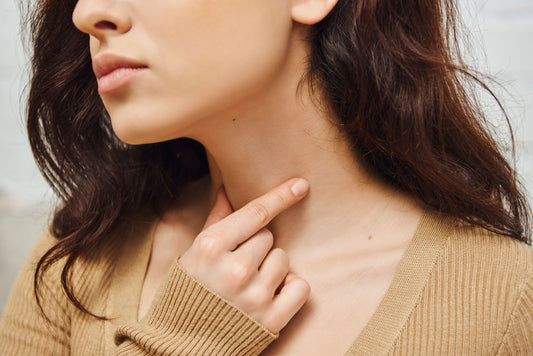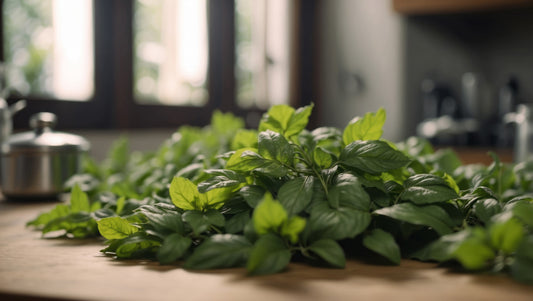by Cecilia Parker, Botanist
No matter what decade of life you’re in, how your body is coping with the passing years is probably on your mind. While our culture has great leaps yet to make in changing its perceptions regarding aging, you’re free to write yourself a fresher script. A well-regulated endocrine system is one of the keys to navigating your lifespan with as much ease as you can. When you add in grounded self-care, curiosity, and a sense of adventure, you have a potent recipe for keeping your glow on through the coming years.
When you hear ‘women’s hormones and aging,’ you might think that estrogen levels are pretty much all there is to it, right? While this mighty messenger is very important, how well your body processes and utilizes your hormones is just as critical to how you experience aging. Tending to your liver and gut health (learn more about the gut here) is a kind of ‘open secret’ to helping your body keep hormones in balance. Protecting and nourishing the liver is great ‘insurance’ against unavoidable environmental challenges. Let’s explore what that could look like!
Hormones and Your Liver
Liver health is crucial to hormone balance: after being produced, hormones (particularly estrogen) are sent to the liver where they are metabolized, then deactivated. Poor breakdown of estrogen can make the hormonal journey through the years much rougher than it needs to be. In the years that you menstruate, this can mean worse cramps, PMS (premenstrual syndrome), and struggles with fertility. When you transition from perimenopause (the years before menopause, when your hormones begin to fluctuate) to menopause, mood swings, sleep disturbances, and hot flashes may intensify. Our daily environment can also contribute to the liver’s workload, through xenoestrogens: synthetic industrial chemicals that have estrogen-like effects and disrupt hormonal balance. These xenohormones are often found in plastics with BPA, chemical pesticides, and harsh chemicals used in cleaning products or body care. Knowing what hard work your liver has to do, here are some everyday choices that will support your body’s detoxification processes to optimize your hormonal profile at any age.
Love Your Liver!
- Eat bitter foods regularly: the taste stimulates your whole digestive system. Look for greens like mizuna, arugula, and dandelion; beets, dark chocolate, and coffee (in moderation!).
- Use herbs that help protect and support the liver: dandelion root, milk thistle seeds, turmeric, garlic, amla, artichoke leaf, and burdock.
- Use body care and cleaning products with the simplest, least toxic ingredients possible to minimize the liver’s chemical load.
- Keep alcohol consumption to a minimum, and limit the use of over-the-counter pain relievers like acetaminophen and ibuprofen: the liver has to work harder to break these down. Once the liver has broken down your hormones, what’s left is inactivated, and sent to the gut to be excreted or recirculated.
Hormones and Your Gut
Dr. Aviva Romm says, ‘There’s a continuous conversation taking place between your GI tract and your endocrine system.’ Science has discovered that your gut interacts with your hormones in a pretty direct way, influencing energy and mood as much as your sexual mojo. The ‘estrobolome’ is a specialized collection of bacteria within your gut that are solely dedicated to breaking down estrogens. Your gut, and specifically your estrobolome, really thrives on plants with compounds known as phytoestrogens: foods like leafy greens, beans, and tofu whose chemical structure is similar to our own hormones. Phytoestrogens from food are transformed by your gut into estrogen-like compounds to help when your estrogen is low, and they may also help protect you from excess estrogen (particularly those creepy xenoestrogens) by blocking your receptors when your levels are too high.
Previous blogs have gone into depth about the crucial role gut health plays in your overall health (link), so we’ll just recap here: refined sugars and unhealthy fats decrease the beneficial bacteria in your gut, leading to imbalances in everything from your digestion to your cognitive function. A healthy microbiome is fed by lots of plant food, fiber, and fermented goodies. The good news is that even when you make less-than-optimal choices in what you’ve consumed, your microbiome can rebound/repopulate fairly quickly after you give it the good stuff. Here are some tips on tending your ‘gut garden’:
Power To The (micro)Biome!
Some tips on tending your ‘gut garden’:
- Get as much plant fiber into your diet as you can. Fiber feeds your good bacteria and helps to ‘mop up’ and sweep out metabolic waste, including spent hormones. Eat up on fruits, veggies, and whole grains. When possible, opt for organic, in-season and local selections to reduce pesticide consumption.
- Harness lignan power! Foods like lentils, beans, and flax meal are high in lignans, a phytoestrogen that can block the absorption of xenoestrogens: a big plus for hormone balance (see our recipe for a yummy, seedy snack).
- Lean on herbal gut allies like marshmallow root, broad or narrow leaf plantain (herb, not the cute little banana-like fruit), and triphala to soothe your intestinal tract and keep you regular.
- Don’t forget the ferments: sauerkraut, kefir, kimchi, kombucha, and pickled veggies can give a nice boost to your gut’s beneficial bacteria.




